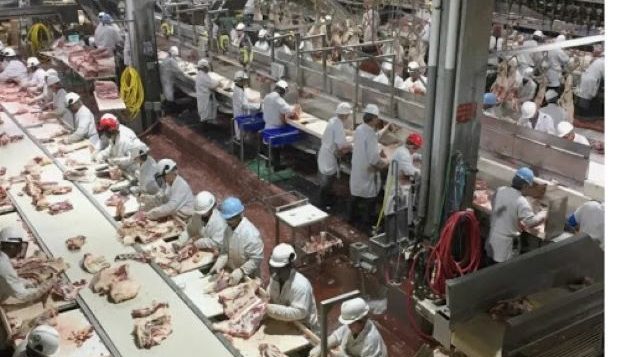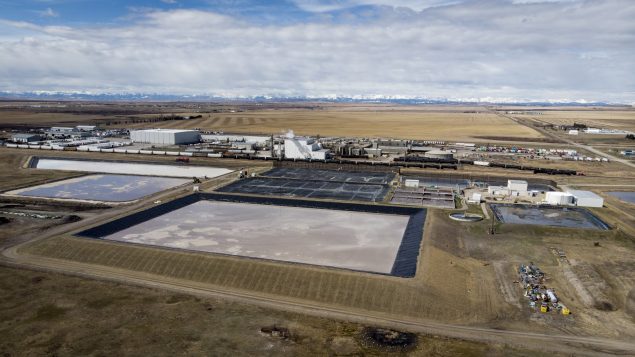There are renewed calls for Cargill to close its meat-processing plant in High River, Alberta, following the death this weekend of a third person linked to the facility.
The Alberta government announced Monday that the man who died was in his 50s and had worked at the plant before getting sick a month ago.
On Tuesday, union officials identified him as Benito Quesada, 51, a union shop steward and a native of Mexico who had worked at the High River facility since 2007.
His death prompted Official Opposition New Democratic Party and union leaders to –-once again–call on the province to shut the plant down and to find out if the company is meeting legal obligations to involve workers in safety concerns.

Workers prepare beef to be packaged at the Cargill facility near High River, Alberta. This image was taken by a worker prior to the COVID-19 pandemic. (CBC News/Name withheld by request)
The calls also follow a review by Alberta Occupational Health and Safety (OHS)–published Saturday by CBC News–that found that Cargill did not attempt to engage worker representation as it investigated the circumstances that led to the largest COVID-19 outbreak linked to a single facility in Canada.
Both the workers at the plant and union leaders have long said the plant is not safe.
However, days after dozens of cases of COVID-19 were confirmed at the facility in April, a video call inspection by provincial health and safety investigators concluded the plant was safe to remain open.
But the virus continued to spread at the facility.
More than 1,500 COVID-19 cases have been linked to the plant, including about 950 employees–close to half of the 2,000-person workforce.
The CBC’s Sarah Rieger reports that there are currently 25 active cases of COVID-19 and 920 have recovered.

Three people linked to the High River facility have now died. Hundreds of others have contracted COVID-19. (Dan McGarvey/CBC)
The previous two deaths were Hiep Bui Nguyen, a 67-year-old woman who worked at the plant, and Armando Sellegue, the 71-year-old father of a worker at the plant, which closed down for two weeks in April before resuming operations last Monday.
The United Food and Commercial Workers (UFCW) Local 401, which represents the mainly Filipino workers at the plant, says the Alberta Occupational Health and Safety review confirms what the union has long said: more employee involvement is needed to make sure the slaughterhouse is safe.
Hughes says the union has been asking to be involved in a review of the plant since the outbreak began.

Cargill is one of the two primary beef suppliers for McDonald’s Canada, and normally processes about 4,500 cattle per day at this time of year. (THE CANADIAN PRESS/Jeff McIntosh)
A statement from Cargill said the OHS has given the company more time to complete its investigation into the High River plant and to further involve the facility’s joint health and safety committee.
“It is common during an investigation for OHS officers to direct the employer to consider additional information as part of the investigation,” the statement said.
Cargill said Occupational Health and Safety would be required by law to issue a stop-work order if the plant were found to be unsafe, and that hasn’t happened.
Earlier on Monday, provincial NDP Labour Critic Christina Gray renewed the Opposition’s call for Cargill to close and for an external investigation into the outbreak, citing the OHS report.

Christina Gray said Monday the Cargill plant should close. (CBC News)
There are currently two other outbreaks at meat-processing facilities in Alberta.
At JBS in Brooks, there are 58 active cases of COVID-19 and 548 employees have recovered.
There are 16 active cases of the virus at Harmony Beef in Balzac and 22 have recovered.
Both plants remain open.
Cargill and JBS process about 85 per cent of beef sold in Canada.
Cargill announced over the weekend that it will temporarily close a facility in Chambly, Quebec this Wednesday to begin testing workers – voluntarily – for COVID-19. The plant prepares meat for grocery stores and other retail customers.
The company said at least 64 workers– about 13 per cent of the workforce – had tested positive for COVID-19 and three employees had recovered.
With files from CBC News (Sarah Rieger, Joel Dryden), The Canadian Press (Bill Graveland)







For reasons beyond our control, and for an undetermined period of time, our comment section is now closed. However, our social networks remain open to your contributions.